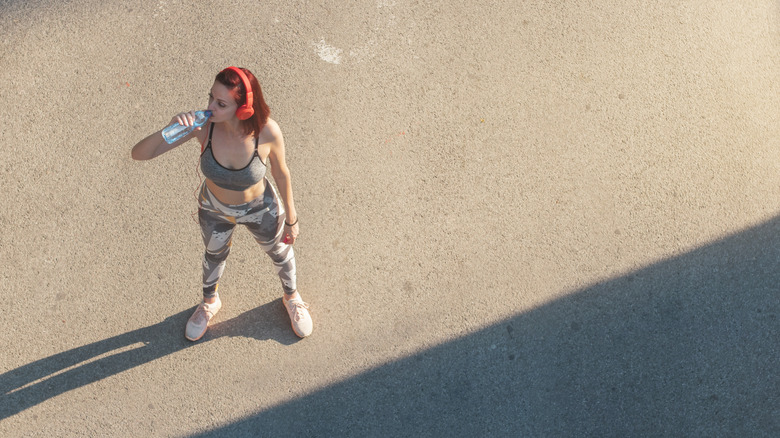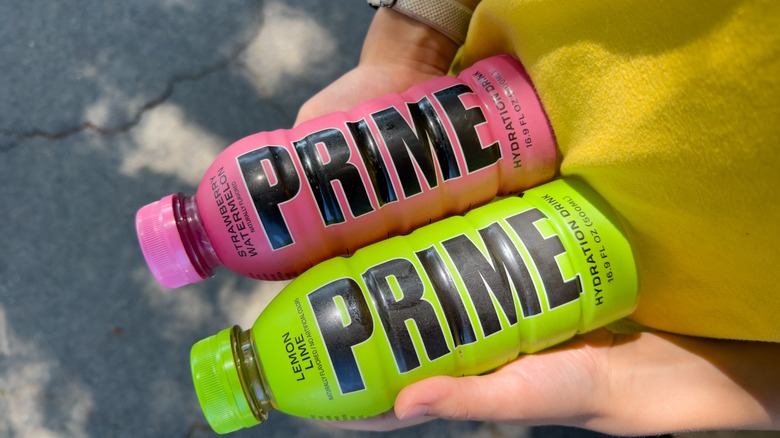Do You Actually Need To Invest In Trendy Electrolyte Drinks? Here's The Deal
It seems like everywhere you look there is a new water, powder, tab, or formulated drink joining the already very crowded electrolyte drink market. In fact, the global electrolyte drink market hit $33.4 billion in 2022 (and is only expected to grow even further with projections forecasting the market will hit almost $59 billion by 2032). This means there is a LOT of money to be made, which is probably exactly why you keep seeing these trendy electrolyte drinks everywhere. Despite how ubiquitous they are, do you really need them?
It can be easy to think drinking these beverages is healthier for you, or that they will keep you more hydrated (especially if you're someone who forgets to drink enough water.) The fancy marketing campaigns that accompany these beverages can fuel that feeling. However, while there is definitely big money involved in selling the idea that people need extra electrolytes, the science behind these beverages doesn't necessarily add up. To make matters worse, the high sugar content and artificial ingredients in many electrolyte drinks can actually have negative health effects.
Do people actually need electrolyte drinks?
For starters, electrolytes are minerals found in your body — everywhere from your blood to your organs to your bodily fluids. Electrolytes do a lot for us, but perhaps most notably they keep the amount of water in your body balanced. This ensures that nutrients can move easily through your cells, while also helping your muscles, nerves, and organs function properly. You lose these necessary electrolytes when your body is dehydrated. This is where electrolyte drinks come in, marketed as a way to correct the loss that happens when you sweat from, say, a trendy new TikTok treadmill workout.
So, are these drinks really required to replenish your electrolyte levels? No. Maggie Moon, M.S. R.D., nutrition consultant and bestselling author told Mind Body Green, "Under normal conditions, most people have zero need for specially formulated electrolyte beverages." As long as the amount of water you consume in a day is equal to the amount you lose, your electrolyte levels will be balanced – no fancy sports drink required. To give you an idea of what that amount is, Western Kentucky University advises taking your weight in pounds and multiplying it by two-thirds. This gives you the target amount of water in ounces you should aim to drink every day. If you engage in physical activity, add 12 more ounces for every half hour you work out.
Another thing to consider when thinking about hydration is actually your diet. Since electrolytes are minerals, eating fruits and vegetables high in potassium, magnesium, and calcium can help ensure that your body keeps its electrolytes at the proper levels. Moon explained, "Though many Americans fall short on two key electrolytes, calcium and potassium, it is best to get these from food." While most of us might not think of leafy greens as keeping us hydrated, science says otherwise.
What is actually in electrolyte drinks?
The main ingredient in most electrolyte beverages is sodium. However, as Moon explained to Mind Body Green, "On average, American adults already consume about 150% of the recommended maximum amount of sodium: 3,400 mg compared to the recommended 2,300 mg max per day." This means that, for most people, additional sodium is entirely unnecessary. This can obviously vary, especially for those who are active, those who live in hotter climates, and those who really love hot yoga. But for the average person, a mix of healthy food and regular water is all that's required.
Another thing to consider is that most electrolyte drinks contain some level of sugar. While some sugar can actually help you rehydrate by increasing water absorption, too often electrolyte drinks contain way more than what is required. Excessive amounts of sugar can actually end up having the opposite effect by slowing down your water absorption in addition to causing a multitude of potential health issues.
Similarly caffeine, artificial sweeteners, and artificial food dyes are common ingredients in electrolyte drinks. In addition to being petroleum-based, artificial dyes have been linked to increased hyperactivity in children as well as allergic reactions in some people. In fact, some of the FDA-approved dyes in the US are actually banned in other countries (we're looking at you Red Dye 40). As for artificial sweeteners, research has linked them with a higher risk of stroke, heart disease, and even death. For this reason alone, electrolyte drinks are worth avoiding in large quantities.


